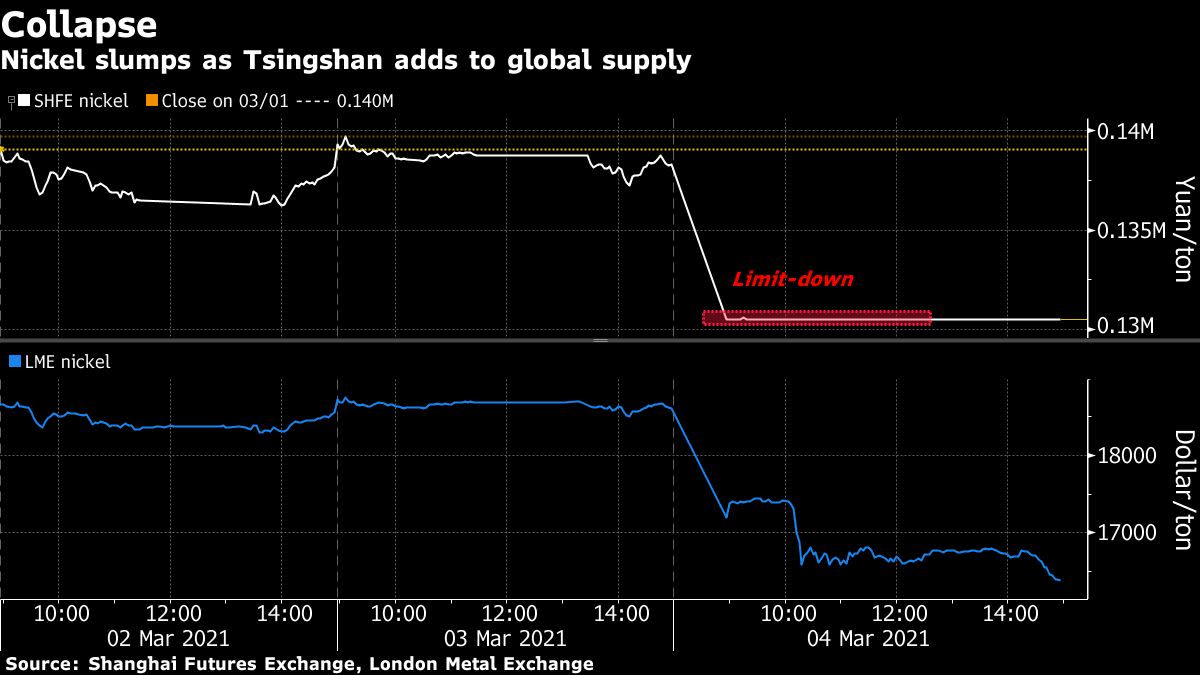(Bloomberg) – Fourteen years ago, China’s Tsingshan Holding Group Co. overthrew the nickel market with a cheaper way to extract the metal used to make stainless steel. They seem to be doing this again, this time with a focus on the batteries.
The company’s new way of producing nickel for batteries potentially breaks through one of the biggest bottlenecks to meet growing demand, undermining a fundamental pillar that sustained the market. The prospect of additional supply saw the metal cover its biggest loss in two days in a decade, and although prices rose on Friday, they are still close to a three-month low.
Tsingshan’s move dates back to the early 2000s, when a commodity boom fueled by China saw prices for metal used in everything from kitchen utensils to airplanes rise above $ 50,000 a metric ton in 2007.
The rally, and a supply chain largely controlled by the West, prompted Tsingshan to look for a cheaper alternative. She found a way to use nickel pig iron from huge deposits in Indonesia, releasing a low-grade substitute that helped bring prices below $ 10,000 just two years later.
Read more about how Tsingshan built its dominance in the metal market
Now the world’s largest stainless steel manufacturer and a major nickel producer is stirring the market again. With prices rising along with talk of another super cycle and an optimistic outlook for battery demand amid a global energy transformation, the group said it will start supplying nickel matte to battery material producers and plans to expand investments of nickel in Indonesia.
“2007 and 2021 are two milestones for the nickel industry,” said Wenyu Yao, senior commodities strategist at ING Bank.
Nickel rose 1.8% to close at $ 16,425 a ton at 6:07 pm on the London Metal Exchange, after falling 14% in the previous two days. The most active contract in Shanghai ended its worst day since the start of negotiations in 2015. Most of the other metals in the LME rose on Friday.
Tsingshan crosshairs
Tsingshan plans to process pig iron from nickel – until now used only for stainless steel – into an intermediate product known as matte that can be further refined into battery nickel. This could open up a major new supply route for Indonesia’s low-grade laterite ore mines for electric vehicles and likely reduces the chances of a structural deficit for the material that Elon Musk said was the biggest concern for Tesla Inc. batteries.
Currently, nickel traded on the stock exchange is only for so-called Class 1 nickel, which must have a minimum purity of 99.8%. This type of nickel represents only less than 25% of the total refined nickel supply, according to ING.
“If the new methods that Tsingshan developed can be widely applied to produce matte and later convert to sulfate, we can see a convergence of Class 1 and Class 2 prices,” said Yao of ING on Thursday in a note to customers.
Even so, there are possibilities of setbacks considering that the process is new for the company, according to Celia Wang, an analyst at Mysteel.
It may also take time for matte production to increase substantially. Sydney-based Nickel Mines Ltd., which has a Tsingshan group company as a major shareholder, said on Friday that its projects at the Morowali Industrial Park in Indonesia have not yet undergone the minor modification needed to make the matte. and will continue to sell NPI to Tsingshan’s stainless operations.
Nickel prices were trading at a six-year high recently, last month, due to expectations that rising demand for EVs would cause a shortage. Musk said in February that nickel was Tesla’s main concern for increasing production of lithium-ion cells and was behind a shift in the use of iron for some EV batteries.
Nickel is central to the global transition to clean energy. It packs more energy into batteries and allows producers to reduce the use of cobalt, which is more expensive and has a supply chain that is considered to be less transparent. Musk’s previous comments have drawn attention to the possibility of a crisis. He pleaded with miners last year to produce more, promising a “giant contract” for the supply produced efficiently and in an “environmentally sensitive manner” amid concerns that a deficit is approaching as early as 2023.
For more articles like this, visit us at bloomberg.com
Sign up now to stay up to date with the most trusted business news source.
© 2021 Bloomberg LP
